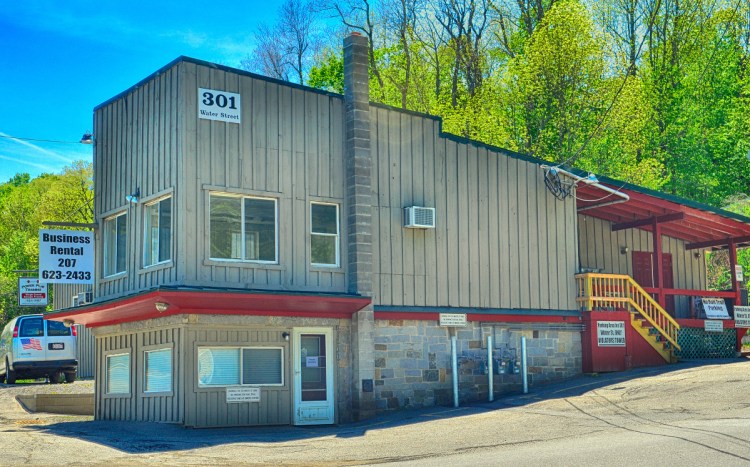AUGUSTA — As medical marijuana retail shops open in communities across central Maine, city councilors in the state’s capital city have banned all such establishments temporarily.
In an emergency measure last week, Augusta city councilors imposed a moratorium on medical marijuana storefront operations because, they say, they could set up shop in the city with little or no regulation.
City Attorney Stephen Langsdorf said he’s surprised one or more such businesses haven’t opened in Augusta already, noting some have opened in Manchester, Hallowell and Gardiner.
“The storefronts, those could happen at any time, while you’re still in the process of sorting things out,” Langsdorf told city councilors before their series of votes on marijuana-related proposals Thursday. “It has been surprising you haven’t had any. They’re all over the place.”
The 180-day moratorium bans any medical marijuana caregiver storefronts anywhere inside city limits. Councilors expressed fear that retail caregiver shops could open in Augusta while the city has no regulations in place to control where, when, or how they operate. They said a moratorium would give a committee working on the issue time to propose regulations.
“We just want some control,” said Ward 3 Councilor Harold Elliott, a member of the committee working on recommendations for local rules to regulate marijuana-related businesses. “We don’t want a store popping up on every corner, in every neighborhood. Eventually, if we don’t do anything, we could have storefronts all over Augusta and not be able to do anything about it.”
Retail medical marijuana caregiver stores are not new to the capital region.
Maine has eight highly regulated medical marijuana dispensaries and about 5,000 caregivers who, local officials said, face much less legal scrutiny than dispensaries do.
In addition to the Wellness Connection, which has dispensary locations in Gardiner, Bath, Brewer and Portland, Summit Marijuana, a caregiver storefront, opened in Gardiner just under a year ago. In Manchester, Earthly Delights of Maine operates on Western Avenue.
Earlier this week, the Hallowell Planning Board held a public hearing on caregiver Jarrod Desjardins’ plan to open up Cold Brook Cannabis on the second floor at 301 Water St. and approved his conditional use permit.
Desjardins said Friday the Planning Board review was required because the space he’s renting on the second floor of the building has been unoccupied for more than a year.
He likes the location because it’s outside the construction zone in Hallowell’s historic downtown, he said, and it offers parking and a measure of privacy to his patients.
“It’s great to get it away from your home,” he said. “It’s a safety factor.”
He said Cold Brook Cannabis is expected to open in the first half of June, once he finishes installing a security system and adding some walls to the space.
While he plans to accommodate walk-in patients, he may opt to see them by appointment only.
His is not the first medical marijuana caregiver storefront in Hallowell; it joins the Cannabis Healing Center at 184 Water St.
RULES AND REGULATIONS
Many towns have no provision to regulate the number and location of medical marijuana retail stores.
Mark Arsenault, code enforcement officer for Winthrop, said the town’s ordinances contain no grounds to deny them in Winthrop. It’s the same in Gardiner, according to Patrick Wright, the city’s economic development coordinator.
Marijuana has been much on the minds of state elected officials.
While medical marijuana has been legal in Maine since 1999, and a regulatory system — including limits on the number plants and the number of patients that caregivers can serve — has long been in place, state lawmakers took a run at revising it earlier this year.
The bill, L.D. 1539, would expand the number of people who could qualify for a medical marijuana card. The number of state-licensed dispensaries would increase, the number of patients each caregiver could see would increase, and storefronts would be allowed explicitly. However, the bill also would impose regulations, including inspections and heightened security requirements, on caregiver stores.
This slate of proposals was developed alongside a long-debated plan to launch the state’s recreational pot market, after state voters narrowly approved in November 2016 making possession and use of limited amounts of pot legal. The citizen’s initiative opened the door to a range of opportunities that were not possible before, including pot-related commercial enterprises such as retail shops.
While lawmakers approved the recreational marijuana bill in April and overrode a veto by Gov. Paul LePage in May, the rules have not yet been drafted.
The medical marijuana bill remains in limbo; it’s among the bills the Legislature failed to act on before the session ended earlier this year.
CYCLING CONCERNS
Augusta officials are particularly concerned about the practice of cycling medical marijuana patients in retail stores.
The original medical marijuana law allowed a caregiver growing marijuana to supply up to five card-carrying medical marijuana patients at one time. But some caregivers have used a gray area of the law to cycle through patients, serving five patients, then discharging one or more of those five so they can take on new patients. City officials said the practice could allow a caregiver to serve hundreds of patients. And that, they said, would have a much larger effect on neighbors because of the potential for increased traffic.
Catherine Lewis, president of the board of directors of Medical Marijuana Caregivers of Maine, a trade association for caregivers and patients and owner of Homegrown Healthcare of Maine, a caregiver store in Winthrop, has said the practice of cycling in new patients is legal and nothing is wrong with it.
It gives patients the ability to shop around for their medicine, she said, by leaving one caregiver and going to another.
Councilors in Augusta voted 6-1 Thursday to adopt the moratorium as an emergency measure, which required a two-thirds vote and which waives a city charter requirement for two separate readings of ordinance changes, putting the moratorium in effect immediately.
The emergency declaration states an emergency exists “because the Code of Ordinances is insufficient to prevent serious public harm that could be caused by the unregulated development of medical marijuana storefronts.”
Augusta already has a moratorium on recreational marijuana retail sales in place. Councilors voted, also 6-1, to extend it 180 more days, to mirror the new moratorium on medical marijuana storefront shops.
At-large Councilor Corey Wilson, the lone dissenting vote, said he’s concerned that putting multiple moratoriums in place banning marijuana-related businesses could leave the impression the City Council is against allowing any such businesses. He noted the council has not voted yet on whether to allow such operations for the long term.
Even though rule-making on the recreational pot market is expected to take place, local officials say they don’t think the state will do so until after Gov. Paul LePage, an opponent of legalization, leaves office.
Augusta councilors also are considering establishing local rules for medical marijuana caregivers operating out of their homes, regulating them as home occupation businesses. They voted to send proposals to regulate such home-based businesses to the Planning Board so the board can make a recommendation to send back to the council.
The land-use proposals councilors directed the Planning Board to consider include:
• Limiting caregivers based in their homes to two patient visits per day,
• Requiring all visits from patients to be by appointment,
• Limiting growing to inside buildings,
• Requiring an odor control system to prevent the odor of marijuana from being detectable outside the building, and
• Requiring the portion of the home where medical marijuana is grown and stored to be secure and locked at all times.
The proposed local zoning rules would require caregivers to get a permit from the city, because under current state law there is no way for local officials to know who caregivers are or where they are located, according to Matt Nazar, city development director.
That makes regulating those operations difficult, which he said could harm residential neighborhoods if left unchecked.
Keith Edwards — 621-5647
Jessica Lowell — 621-5632
Twitter: @JLowellKJ
Send questions/comments to the editors.





